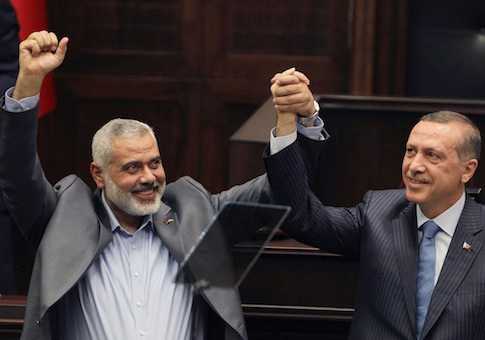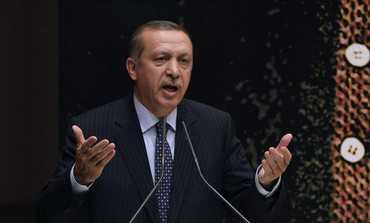Turkish PM prepares to meet with terrorist group in Gaza Strip
BY: Adam Kredo
April 4, 2013 8:59 am

Turkish Prime Minister Recep Tayyip Erdogan is preparing to meet the Hamas government in Gaza, a move that could further inflame regional tensions.
Preparations for the visit come as Secretary of State John Kerry returns to the Middle East this weekend to patch up relations between Turkey and Israel. Kerry will spend Saturday visiting Israel, the West Bank, and Turkey as he seeks to find common ground between skeptical Middle East leaders, according to reports.
Erdogan’s trip will follow a tenuous diplomatic breakthrough between the Islamist Turkish prime minister and Israeli Prime Minister Benjamin Netanyahu, who recently apologized to Erdogan for a deadly 2010 incident between the two nations that claimed the lives of eight Turks.
It remains unclear just how much headway Kerry will be able to make given Erdogan’s hesitance to embrace Israel fully and back away from his support for Iran and Hamas, according regional experts.
Erdogan has long acted as one of Hamas’s top cheerleaders, leading the charge to legitimize the terrorist group. The relationship blossomed long before the deadly 2010 flotilla raid harmed relations between Turkey and Israel.
“This certainly didn’t start with the flotilla,” said David Pollock, a former Middle East adviser at the State Department. “It goes back not only longer, but deeper because support for Hamas is not just against Israel but is in line with Erdogan’s overall Muslim Brotherhood orientation, his Islamic orientation.”
“The question that I would ask is not only why does Erdogan support Hamas against Israel but also support Hamas against the Palestinian Authority and [PA President] Mahmoud Abbas,” said Pollock, who currently serves as a senior fellow at the Washington Institute for Near East Policy.
The PA has opposed Erdogan’s planned trip to Israel, claiming it will only “deepen divisions among the Palestinians,” according to regional media reports.
Erdogan announced he would visit Gaza and Hamas after Netanyahu offered his apology, leading State Department spokesman Patrick Ventrell to express “deep concern” during a press briefing on March 27.
Erdogan, recently dubbed by President Barack Obama as one of his top five international friends, is attempting to consolidate power by appealing to all sides, experts said.
“He tries to play both sides,” Pollock said. “He patched things up supposedly with Netanyahu on Obama’s recent visit [to Israel], but he continues to show support for Hamas. It’s possible in his mind he actually believes Hamas can be brought around to accept peace with Israel, but if he does, it isn’t true. There’s a real contradiction here.”
Erdogan has said he is Hamas’ champion, even claiming in the past that he wants to “represent Hamas on international platforms.”
The Turkish prime minister remains committed to engaging Hamas at every opportunity despite its ongoing terrorist activities.
“We should not be squeezing them into the corner,” he said in a 2009 speech before the European Union.
Erdogan has even vowed to personally escort any flotilla that seeks to break Israel’s naval blockade of the Gaza Strip—a promise that was made well after the deadly 2010 incident.
Hamas leaders also view Erdogan as a top ally.
Hamas Prime Minister Ismail Haniyeh named his grandson after Erdogan so that the Turkish leader’s name “reverberated on every tongue” in the Gaza Strip, according to a 2010 report in Today’s Zaman.
Erdogan and Hamas have rallied around their opposition to Israel.
Erdogan has dubbed Israeli military operations against Hamas fighters “state terror.”
When Israel launched its 2008 military incursion into Gaza to combat ongoing terrorist rocket attacks, Erdogan described it as “an act of disrespect toward Turkey.”
“The crucial break point for Erdogan in this area was not the flotilla, but the Gaza war in December of ’08,” said Pollock. “That was the turning point. He took it very personally.”
Hamas attacks on Israel are justified in Erdogan’s view.
“I do not think that Hamas is a terrorist organization,” he said in April 2010, according to the Hurriyet Daily News. “I said the same thing to the United States. I am still of the same opinion. They are Palestinians in resistance, fighting for their own land.”
Erdogan’s recent bid to soften tensions with Israel are aimed at boosting his own image, according to Tony Badran, a research fellow at the Foundation for Defense of Democracies (FDD).
“Turkish officials are of the belief that, ‘We are going act as a mediator that is going to lead the [peace] process,’” Badran said. “That’s how they’re putting it out. He’s trying to raise the profile of Turkey as a mediator once again, specifically using the Palestinians as a platform”
The United States has been left with few diplomatic options given the regional climate.
“Realistically, we have to deal with this guy,” said Pollock. “He’s in charge of a very, very important country for the region and for us. I think he has his mishegas [craziness], but he’s demonstrated that he can be quite pragmatic toward us and even toward Israel. We have to make the best of not a great situation.”
This entry was posted in Middle East and tagged Hamas, Israel, John Kerry, Recep Tayyip Erdogan, Turkey. Bookmark the permalink.
via Turkish PM prepares to meet with Hamas | Washington Free Beacon.





